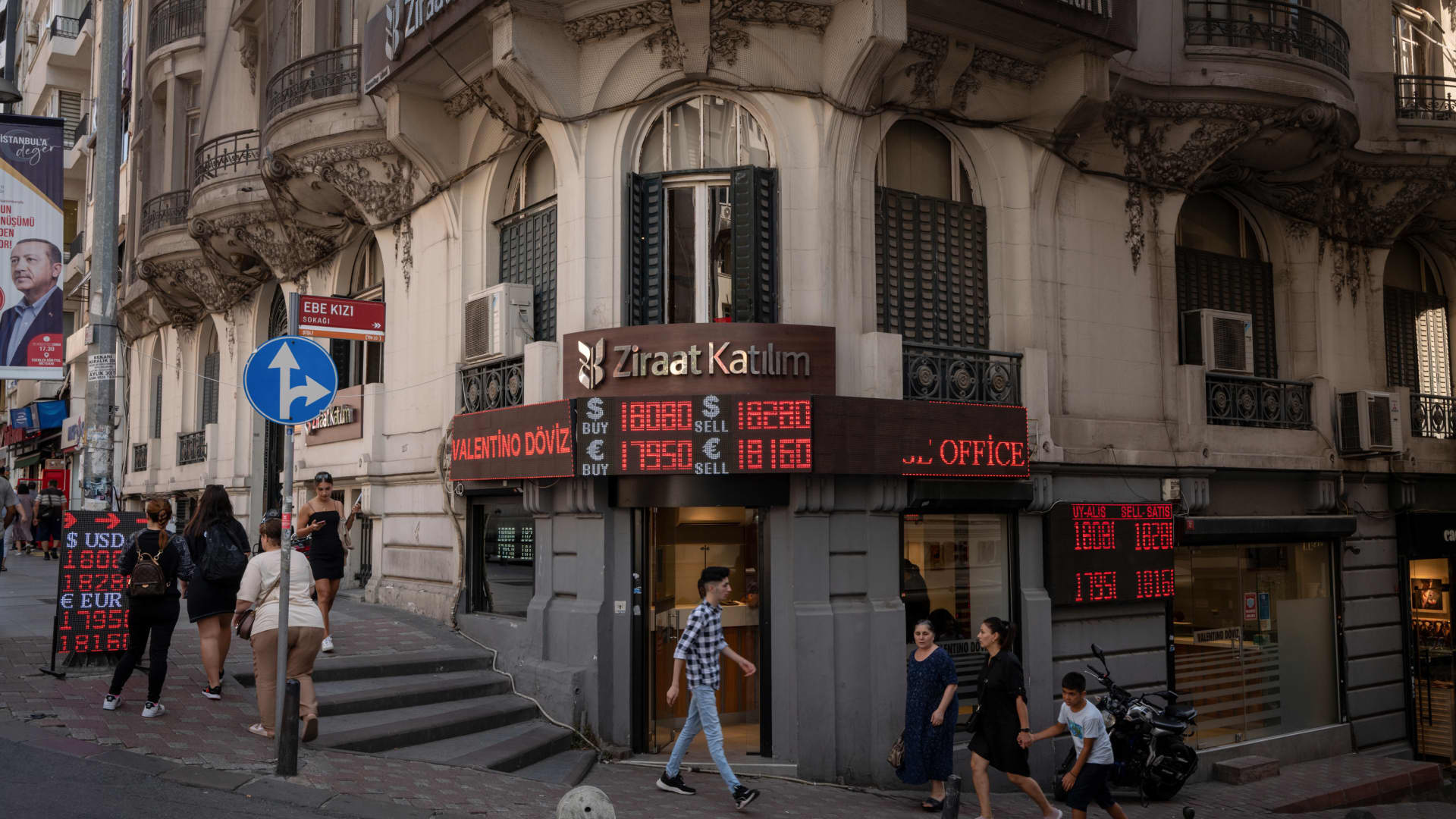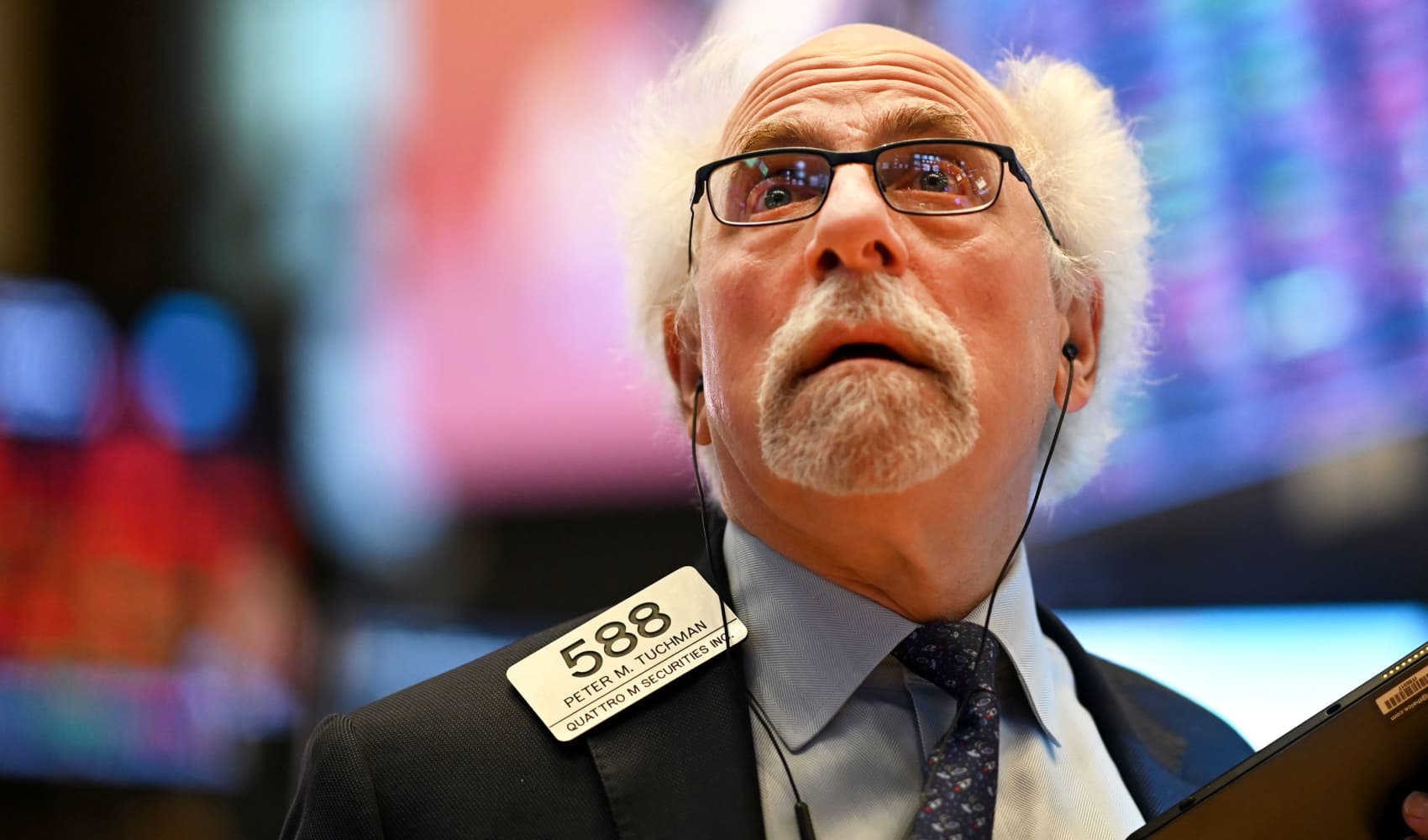
- The country's monetary policymakers opted for a 100 basis point cut, bringing the key one-week repo rate from 13% to 12%.
- In August, Turkish inflation rate was recorded at 80.2%, speeding up for the 15th consecutive month and the highest level in 24 years.
Turkey's central bank surprised markets once again with its decision Thursday to cut its key interest rate, despite inflation in the country surging beyond 80%.
The country's monetary policymakers opted for a 100 basis point cut, bringing the key one-week repurchase rate from 13% to 12%. In August, Turkish inflation rate was recorded at 80.2%, quickening for the 15th consecutive month and the highest level in 24 years.
Turkey also cut rates by 100 basis points in August, and had gradually lowered interest rates by 500 basis points at the end of 2021, setting off a currency crisis.
Get Connecticut local news, weather forecasts and entertainment stories to your inbox. Sign up for NBC Connecticut newsletters.
A statement from the Central Bank of the Republic of Turkey said it has "assessed that the updated level of policy is adequate under the current outlook," according to Reuters. It said the cut was necessary as growth and demand continued to slow and also cited "escalating geopolitical risk."
It said markets should expect the "disinflation process to begin" on the back of the measures taken, Reuters reported.
The policy direction has long stunned investors and economists, who say the refusal to tighten policy is a result of political pressure from Turkish President Recep Tayyip Erdogan, who has long railed against interest rates and turned against economic orthodoxy by insisting that lowering rates are the way to bring down inflation.

The monthslong campaign to continuously lower rates as Turkey's trade and current account deficits balloon and its foreign exchange reserves run low has instead sent Turkey's currency, the lira, into a multiyear tailspin.
Money Report
The lira has lost more than 27% of its value to the dollar year to date, and 80% in the last five years. Following the bank's rate decision announcement, the currency was down a quarter of a percentage point, trading at a record low of 18.379 to the dollar.
More danger ahead for the lira
Many economists predict a further fall in the lira. London-based Capital Economics sees it falling to 24 against the greenback by March 2023.
"Room for further easing is becoming increasingly limited because of the pressure this is putting on the lira and real rates," Liam Peach, the firm's senior emerging markets economist, told CNBC. "Turkey is running such a large current account deficit, and it has become dependent on inflows of foreign capital to finance that. FX reserves in Turkey are so low that the central bank is really in no position to step in," he said.
At some point, confidence will run so low that those vital inflows will likely dry up, Peach warned, "Cutting interest rates further makes it more difficult for Turkey to attract those capital flows."

Erdogan, meanwhile, remains optimistic, predicting that inflation will fall by year-end. "Inflation is not an insurmountable economic threat. I am an economist," the president said during an interview Tuesday. Erdogan is not an economist by training.
Turks will likely continue to struggle as their basic living costs rise, and Russia's ongoing war in Ukraine has dramatically worsened price inflation on goods and energy globally.
But ultimately, said Erik Meyersson, a senior economist at Stockholm-based Handelsbanken Capital Markets, "the most pressing problem is one of domestic economic mismanagement by the ruling regime."
Election planning?
Meyersson and other analysts view Erdogan's decisions as primarily driven by elections next year.
"Given upcoming elections, a disproportionate focus will remain on propping up short-term economic growth, putting further upward pressure on inflation as well as the lira," he said. "The Turkish government's ability to avert a deeper financial crisis may appear to be a success, but its more important failure is the slow strangulation of the country's economic potential."
Erdogan's government has also launched several spending projects ahead of the elections, including relief measures for utility bills and an expansive social housing project, says Can Selcuki, managing director at Istanbul Economics Research & Consultancy.
"I think you're going to see inflation increase more, but what the government had been counting on would be a deal with Russia to get cheaper gas to at least help the current account deficit on the energy side," Selcuki said, referencing Erdogan's frequent engagement with Russian President Vladimir Putin.
"But I think the recent events also put that deal at risk so I think we will see further devaluation of the lira and increasing inflation," he said.






